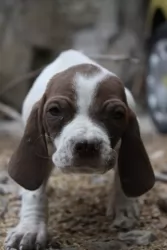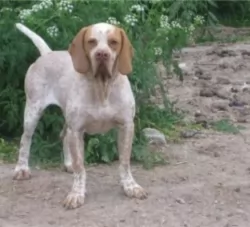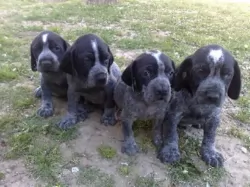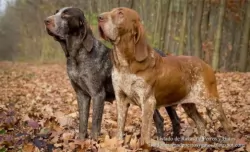 MyDogBreeds
MyDogBreeds Pachon Navarro is originated from Spain but Brittany is originated from France. Both Pachon Navarro and Brittany are having almost same height. Pachon Navarro may weigh 13 kg / 29 pounds more than Brittany. Both Pachon Navarro and Brittany has almost same life span. Pachon Navarro may have less litter size than Brittany. Both Pachon Navarro and Brittany requires Low maintenance.
Pachon Navarro is originated from Spain but Brittany is originated from France. Both Pachon Navarro and Brittany are having almost same height. Pachon Navarro may weigh 13 kg / 29 pounds more than Brittany. Both Pachon Navarro and Brittany has almost same life span. Pachon Navarro may have less litter size than Brittany. Both Pachon Navarro and Brittany requires Low maintenance.
 Known also as the Navarra Pointer, this is a Spanish hunting dog native to Navarre, Spain and descended from the extinct Old Spanish Pointer.
Known also as the Navarra Pointer, this is a Spanish hunting dog native to Navarre, Spain and descended from the extinct Old Spanish Pointer.
Major kennel clubs don’t recognize this dog as a standardized breed, but the Spanish Kennel Club has accepted the Pachón Navarro as a breed.
It is believed that this dog has also descended from other hounds as well as the Talbot hounds. It isn’t a new breed as it is thought that the dog originated in the 12th century already. There were times when the dog almost became extinct but efforts to preserve it have been made and to also establish it as a standardized breed.
 One of the most intense bird dog breeds in existence is the Brittany, bred for hunt. The breed used to be called the Brittany Spaniel, but since the breed is closer to a setter or pointer, that moniker has been dropped. The Brittany is named for the French Province in which they were originally developed. Sometime from the 17th to the 19th centuries, the breed was developed. Images of a very similar dog can be found on 17th century paintings and tapestries. However, the first written description comes from 1850 by a Reverend Davies, describing a hunting episode. The breed was recognized officially in the early part of the 20th century and made a splash at the 1900 Paris Dog Show.
One of the most intense bird dog breeds in existence is the Brittany, bred for hunt. The breed used to be called the Brittany Spaniel, but since the breed is closer to a setter or pointer, that moniker has been dropped. The Brittany is named for the French Province in which they were originally developed. Sometime from the 17th to the 19th centuries, the breed was developed. Images of a very similar dog can be found on 17th century paintings and tapestries. However, the first written description comes from 1850 by a Reverend Davies, describing a hunting episode. The breed was recognized officially in the early part of the 20th century and made a splash at the 1900 Paris Dog Show.
The first official standards were written in about 1907 and the breed was recognized by the American Kennel Club (AKC) in 1934.The Brittany is expected to point to and then retrieve birds and other small ground game. Because the Brittany both points and retrieves they are known in the U.K. as a Hunt, Point and Retrieve breed or an HPR, and they have more Dual Champions than the rest of the AKC Sporting group.
There are actually two types of Brittanys in the minds of many breeders. There is the “French” Brittany and the “American” Brittany. When the breed arrived in the United States in 1931 they became immensely popular in a short period of time. In 1942 American Breeders began the American Brittany Club, rewriting the French standard to fit the dog they knew. Today there are definitely difference between the two sub-sets that can easily be seen. The French dog is smaller than the American dog. The American dog is a runner pacing ahead of the hunter while the French dog works more closely with their human companions. Another visible difference is that the French accept black spotted Brittanys, while in the United States a black spotted coat is considered a fault. Both sub-sets are known for their willingness to follow human directions, their eagerness for the hunt, and their agility and speed.
Unfortunately, the European wars took their toll on this breed as they did on many others. Following the second World War, their numbers in Europe were drastically reduced. The French had stop breeding them altogether during the war. It was in this depleted gene pool that the French agreed to accept the black spotted Brittany. Along with the U.S., Canada also does not recognize the black spotted Brittany.
 This dog is large sized, standing at between 48 and 57cm in height and weighing between 27 and 33kg. A most unusual feature and characteristic unseen in dogs in general is his split or double nose. The nose of the dog serves the same purpose however, as with any other dog.
This dog is large sized, standing at between 48 and 57cm in height and weighing between 27 and 33kg. A most unusual feature and characteristic unseen in dogs in general is his split or double nose. The nose of the dog serves the same purpose however, as with any other dog.
The head is fairly large with a broad forehead. The broad head of the dog is generally solid colored. The coat of the coat of the dog is short and of a hard texture. Colors of the coat are white and brown or white and black or white and an orangey color with ticking.
The eyes are large and brown, the ears are long and broad with a rounded tip and the tail is long too. These dogs have a strong, sturdy body with strong legs.
The Pachon Navarro is a friendly, social, intelligent, loving and loyal dog. He is also gentle and docile with an amicable nature, making him a splendid choice for those with children in the home as well as pets.
He is athletic and energetic and is going to need a good dose of daily exercise. Apart from their strong hunting instincts, they make excellent family pets and companions and is most certainly not a dog to be put outdoors day after day without the contact of his human family.
He is intelligent and a quick learner and will benefit from training and socialization as this makes him obedient and it also bring about positive changes with any bad behavior from this excellent pet.
He requires a kind, firm, patient and consistent owner. This particular dog won’t be suited to living in a tiny property in the city, as they require a lot of space to run and exercise.
 The Brittany is much like other hunting dogs – pointers and retrievers – in size and stature. He is solid and strong but not heavy. He is compact with an average size head and floppy ears, docked tails or short natural tails, and expressively intelligent looking eyes. He is athletic, energetic, and alert. He has a long, elastic and free gait. The French dog is smaller and the dog with black spots is accepted. The American Brittany is larger and only a tri-color of orange, liver and white is acceptable.
The Brittany is much like other hunting dogs – pointers and retrievers – in size and stature. He is solid and strong but not heavy. He is compact with an average size head and floppy ears, docked tails or short natural tails, and expressively intelligent looking eyes. He is athletic, energetic, and alert. He has a long, elastic and free gait. The French dog is smaller and the dog with black spots is accepted. The American Brittany is larger and only a tri-color of orange, liver and white is acceptable.
 The Pachón Navarro is an active, friendly, playful, affectionate dog and he makes a great family pet. He will however want lots of outdoor exercise, making him a suitable companion for active owners. Inactive city dwellers should think of keeping a more docile kind of indoor pet.
The Pachón Navarro is an active, friendly, playful, affectionate dog and he makes a great family pet. He will however want lots of outdoor exercise, making him a suitable companion for active owners. Inactive city dwellers should think of keeping a more docile kind of indoor pet.
Your Pachón Navarro just loves the company of his human family and will be dejected if made to spend all his time outside and away from his owner.
He also takes his role as guardian and protector seriously. Give him what he requires and make him part of the family and he will be a most remarkable friend and companion.
 The Brittany is particularly trainable and friendly. They love to play and are sweet-natured. They don’t due well with harsh correction though and a stern look will cause them to wither. Socialize them young or they can become shy around strangers. They are loyal and family oriented. They can easily become attached to their humans.
The Brittany is particularly trainable and friendly. They love to play and are sweet-natured. They don’t due well with harsh correction though and a stern look will cause them to wither. Socialize them young or they can become shy around strangers. They are loyal and family oriented. They can easily become attached to their humans.
 Pachon Navarros are generally healthy dogs and you’re not likely to spend much time at the vets with these dogs. They can reach up to 15 years of age if looked after well, but with the long ears they are prone to ear infections.
Pachon Navarros are generally healthy dogs and you’re not likely to spend much time at the vets with these dogs. They can reach up to 15 years of age if looked after well, but with the long ears they are prone to ear infections.
Moisture, wax and dirt can all build up inside the dog's ears and this can cause a painful ear infection with the dog scratching and pawing at his ear.
Bloat is another illness to look out for and you'll notice your dog is lethargic and has a swollen, hard stomach with gas being trapped inside. The condition is life threatening and will require a trip to the vet.
 The breed is a hardy one and Brittanys are mostly healthy dogs. In Europe 1 in 5 dogs dies of old age and that age is usually 14 or 15 years. They do have a few issues that they may be susceptible to. These would include:
The breed is a hardy one and Brittanys are mostly healthy dogs. In Europe 1 in 5 dogs dies of old age and that age is usually 14 or 15 years. They do have a few issues that they may be susceptible to. These would include:
 Your Pachon Navarros is a low maintenance dog and you will just be required to give him a good brush. He is a moderate shedder and this brushing down will keep the skin and coat healthy.
Your Pachon Navarros is a low maintenance dog and you will just be required to give him a good brush. He is a moderate shedder and this brushing down will keep the skin and coat healthy.
Because of his long, floppy ears, you will need to check inside them because moisture, dirt and wax can build up and encourage an ear infection. Don’t try to clean inside your pet’s ears if you’re not sure how, rather find out about cleaning the ears from the vet.
The nails will also need to be clipped as well as checking regularly on the eyes and teeth.
Your Pachon Navarro is a hardworking dog and you want to ensure tasty, palatable food that is properly digested and eliminated without problems. If you feed your dog a commercially manufactured dog food, choose the best quality and check out the labels.
Make sure that the food doesn’t contain lots of preservatives, colorants and fillers. Some of the best kibble has the right balance of vitamins and minerals in them. With these kind of hunting dogs, it is best to feed your dog hours before vigorous exercise such as a hunt.
Try and vary the regular kibble by adding in simple, but tasty home-made food occasionally. Dogs appreciate simple food without spices and exotic ingredients as its keeps their stomachs free from pain, gas and bloat.
Some chopped up boiled chicken, some brown rice or pasta and some vegetables such as sweet potato, carrots and spinach is super healthy for your pet as well as adding in a little bit of raw meat from time to time.
Remember clean, fresh water must be constantly available.
 Don’t overfeed your Brittany. Keep him at hunting weight by feeding a half a cup up to 2 cups per day depending on the size of your dog and activity levels. Serve this in two meals not one.
Don’t overfeed your Brittany. Keep him at hunting weight by feeding a half a cup up to 2 cups per day depending on the size of your dog and activity levels. Serve this in two meals not one.
Ears – prone to infections – make sure that you check them and wipe them out routinely to prevent infections.
Hip Dysplasia – bones don’t fit well into joints – this can be genetic or otherwise, causing lameness and arthritis. If severe it can require surgery to correct.
Epilepsy – mild or serious seizures are possible. This can be genetic/hereditary but is set off by an infectious disease of the brain, head injury, poison, tumor, or metabolic disorder. There is no cure, but medication can be very effective.
Hypothyroidism – Low levels of thyroid hormone – can cause drooping eyelids, obesity, lethargy, mental difficulties or irregular heat cycles or all of this. Medication is available as it is for humans but must be taken daily for the rest of the dog’s life
Canine Discoid Lupus Erythematosus – autoimmune disease that is rare in dogs. Cats and humans can also have it. It is a skin disease and does not become the more serious and deadly Systemic Lupus. The Discoid version of this disease causes loss of pigmentation and a scaling on the nose which can then progress to the skin around the ears, eyes and genitals. There could be ulcerated lesions and tissue death in more severe cases. Sun exposure can make the condition worse.
The Brittany is a hunting dog that acts like a pointer but will retrieve fowl and birds in the water or on land. If you don’t hunt, the Brittany can still be your family dog. They need lots of exercise and mental stimulation. They need a job if they are not going to hunt and expect them to be distracted by every bird they see. Try flyball, agility, FAST CAT, field trials and dock diving. They are very task oriented and have boundless energy. They excel at obedience and confirmation as well.